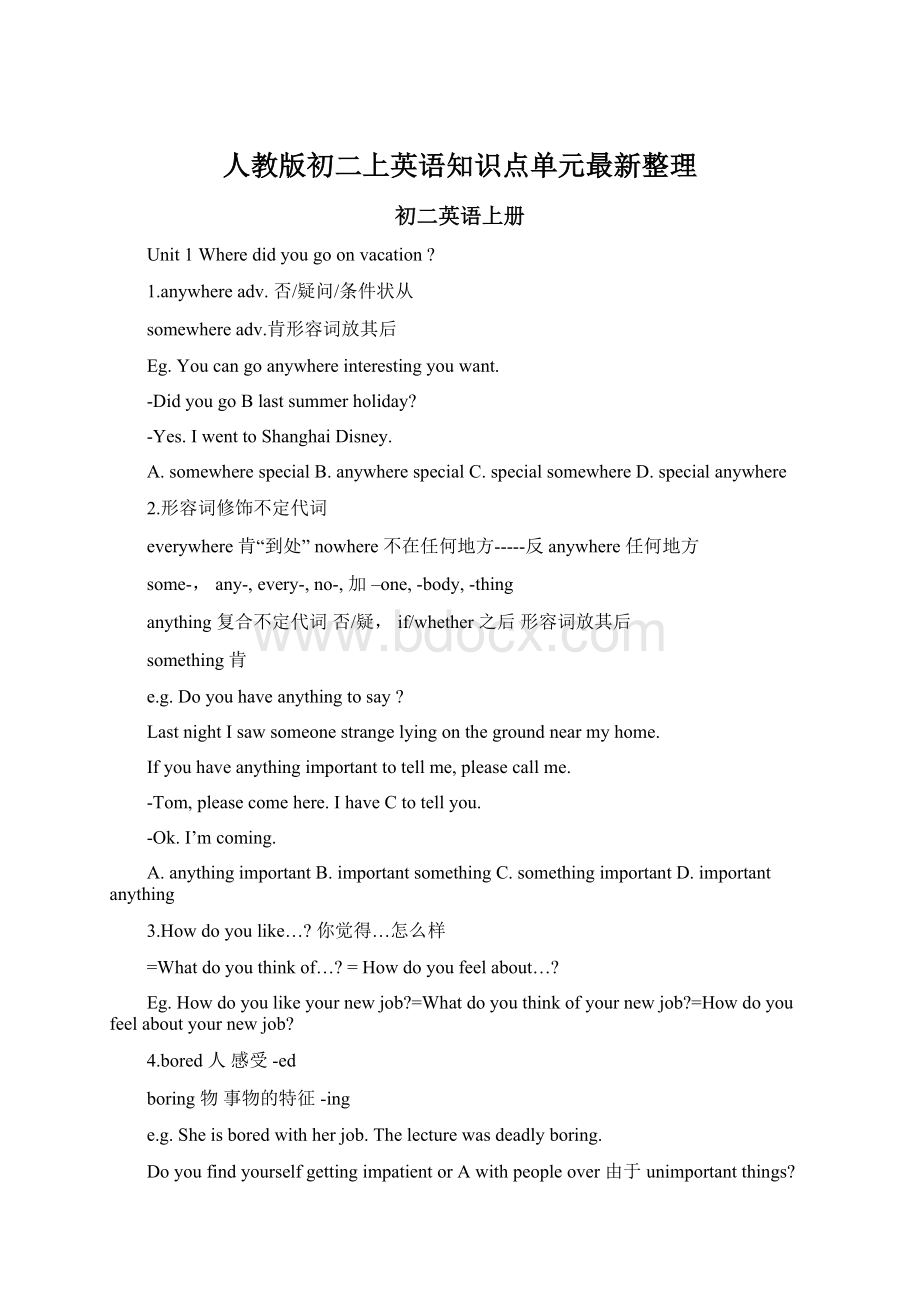人教版初二上英语知识点单元最新整理.docx
《人教版初二上英语知识点单元最新整理.docx》由会员分享,可在线阅读,更多相关《人教版初二上英语知识点单元最新整理.docx(18页珍藏版)》请在冰豆网上搜索。

人教版初二上英语知识点单元最新整理
初二英语上册
Unit1Wheredidyougoonvacation?
1.anywhereadv.否/疑问/条件状从
somewhereadv.肯形容词放其后
Eg.Youcangoanywhereinterestingyouwant.
-DidyougoBlastsummerholiday?
-Yes.IwenttoShanghaiDisney.
A.somewherespecialB.anywherespecialC.specialsomewhereD.specialanywhere
2.形容词修饰不定代词
everywhere肯“到处”nowhere不在任何地方-----反anywhere任何地方
some-,any-,every-,no-,加–one,-body,-thing
anything复合不定代词否/疑,if/whether之后形容词放其后
something肯
e.g.Doyouhaveanythingtosay?
LastnightIsawsomeonestrangelyingonthegroundnearmyhome.
Ifyouhaveanythingimportanttotellme,pleasecallme.
-Tom,pleasecomehere.IhaveCtotellyou.
-Ok.I’mcoming.
A.anythingimportantB.importantsomethingC.somethingimportantD.importantanything
3.Howdoyoulike…?
你觉得…怎么样
=Whatdoyouthinkof…?
=Howdoyoufeelabout…?
Eg.Howdoyoulikeyournewjob?
=Whatdoyouthinkofyournewjob?
=Howdoyoufeelaboutyournewjob?
4.bored人感受-ed
boring物事物的特征-ing
e.g.Sheisboredwithherjob.Thelecturewasdeadlyboring.
DoyoufindyourselfgettingimpatientorAwithpeopleover由于unimportantthings?
A.boredB.boringC.tiringD.tired5.becauseof+n.短语,代词等
Because+句子
e.g.Andbecauseofthebadweather,wecouldn’tseeanythingbelow.Andwecouldn’tseeanythingbelowbecausetheweatherwasbad.6.enough
adj.Ihaveenoughmoneytobuyanewbook.adv.Heisnotoldenoughtogotoschool.
adj.+enough+todosth.足够…做…
Sheisold_enough
_to
makeherowndecision.
7.一般过去时过去发生的动作或状态
(1)肯:
主语+was/were/V-p+其他Wewerepupilstwoyearsago.Iwenttothezoolastweek.
(2)否:
主语+was/were+not;主语+didn’t+V原+其他
Hewasn’therejustnow.
Hedidn’tgotoschoollastFriday.
(3)一般疑问句:
Was/Were+主语+其他?
Did+主语+V原+其他?
Youwereathomethismorning.
Wereyouathomethismorning?
YourbrotherplayedcomputergameslastSunday.
DidyoubrotherplaycomputergameslastSunday?
Unit2Howoftendoyouexercise?
1.不得不;必须
haveto客观需要must主观愿望、看法
Wehadtowalktoschoolyesterday.It’stoolate,Ihavetogonow.
Youmustfinishtheworkbefore.
Wehavetofinishtheworkbeforelunch.
2.wanttodosth.想要做sth.Iwanttogoshopping.
wantsb.todosth.想要sb.做sth.V+宾+宾补Shewantedmetoreaditagain.
类似的动词:
ask,teach,tell,wish,invite,order…
3.begood+介词
begoodto对…很好Sheisgoodtoeveryone.
begoodfor对…有益/有好处Eatingvegetablesisgoodforyourhealth.begoodat擅长HeisgoodatspeakingEnglish.
begoodwith与…相处得好Heisverygoodwiththechildren.doharmto=bebadfor=beharmfulto对…有害
Nowadays,almosteveryoneknowsairpollutionisharmfultopeople’shealth.Itnotonlydisturbsothers,butalsodoesharmtopeople’shearing.
4.it作形式主语动词不定式做真正的主语
Itis/was+adj.+todosth.做sth….(adj.)
Itiseveryone’sdutytoobeythelaw.
ItisdifficultforaforeignertolearnChinese.
Itis/was+adj.(forsb.)+todosth.对sb.来说做sth.是…的
adj.表事物的特征,如easy,hard,difficult,interesting,impossible…
e.g.It’sveryhardforhimtolearntwoforeignlanguages.
Itis/was+adj.ofsb.+todosth.sb.做sth.,真…(adj.)
adj.表人物的性格、品德,常表示主观感情或态度,如:
good,kind,nice,clever,foolish…
e.g.It’sveryniceofyoutohelpme.
5.频率副词
always总是;永远;始终100%usually通常;经常75%
often时常;常常50%sometimes有时20%
hardly几乎不5%never从不0%
6.howoften/soon/long/far
howoften“多久一次”频率
e.g.-Howoftendoyouvisityourmother?
-Onceaweek.
howsoon“多久之后”多久能完成对(从即时起)到将来某个时刻间的时间长短提问,回答通常为in+一段时间
e.g.–Howsoonwillhebeback?
-Inanhour.
howfar“多远”路程
e.g.-Howfarisitfromheretothezoo?
-It’s6kilometers.
howlong“时间多久;物体多长”一段时间/长度一般对过去发生的时间提问
e.g.–Howlongdidhestayhere?
-Abouttwoweeks.
对物体长度提问
e.g.-Howlongistheboard?
-Aboutonemeter.
7.through,across介词穿过
through内部/中间如人群中,阳光中,物体中间等等;可用于抽象
e.g.Thesunlightcomesthroughtheglass.
Idon'tknowhowtheygetthroughthesecoldwinters.
across表面goacross与cross(v./n.)同义across是介词,有“横跨,横穿,穿越”
之意。
e.g.Goacross(Cross)theroad,andyouwillfindthepostofficeonyour
right.
北
TheGreatGreenWallisacrossthenorthwestofChina.绿色长城横跨中国西
Unit3I’mmoreoutgoingthanmysister
1.Both
做主语常与介词of连用,构成both…of…
e.g.Bothofuslikewatchingthetalentshow.
both…and…“两者都”链接两个主语时,谓语动词用复数
e.g.BothmyfatherandmymotherareEnglishteachers.
Practice:
-Pleaseturndownthemusic.CDadMomaresleeping.
-Sorry,I’lldoitrightaway.
A.Neither;norB.Either;orC.Both;andD.Notonly;butalso
2.★反意疑问句的用法规则:
“前肯后方,前否后肯”陈述部分+反义部分希望证实所叙述的内容
两种结构:
①肯定陈述+否定疑问
e.g.Thestudentsenjoyplayingfootball,don’tthey?
②否定陈述+肯定反意疑问
e.g.Youdidn’tgo,didyou?
情态动词/be/have(has)done/do
IcanspeakEnglish,_can’tI?
Ican’tspeakJapanese,_canI?
Shehasn’tbeentoJapan,_hasshe?
Ididn’tgotoschool,_didI?
Practice:
Hehasfewfriendsinhisnewschool,B?
A.hasn’theB.doesheC.isheD.doesn’theSheisanurse,_isn’tshe?
Shehaseatendinner,_hasn’tshe?
Ihaveahouse,_don’t_I?
Ihaveboughtacar,_haven’tI?
Ihaveacold,don’t_I_?
Shelikesme,doesn’t_she?
Heplayedcards,_didn’the?
如何回答,根据事实回答yes/no,是否符合陈述部分
“前否后肯”的回答yes或no与汉语正好相反。
这种省略回答的yes要译成“不”,no
要译成“是”。
Theyworkhard,don’tthey?
他们努力工作,不是吗?
Yes,theydo.对,他们工作努力。
/No,theydon't.不,他们工作不努力。
Theydon’tworkhard,dothey?
他们不太努力工作,是吗?
Yes,theydo.不,他们工作努力。
/No,theydon't.是的,他们工作不努力。
以Let’s开头的祈使句,附加问句用shallwe;以Letus开头的,则用willyou
e.g.Let’sgohome,shallwe?
咱们回家吧,好吗?
Letusgohome,willyou?
让我们回家吧,好吗?
2.★let’s和letuslet’s中us包括对方
e.g.Let’stryagain.咱们再试一下吧Letus不包括对方
e.g.Letusknowthetimeofyourarrival.告诉我们你到达的时间practice:
Mom,let’sgoshopping.妈妈,我们一起去购物吧
Mom,letusgoshopping.妈妈,请允许我们去购物
3.as…as…的用法“像……一样……”用于同级比较
①“as+形容词/副词的原级+as…”表示两者在某一方面相同或相等
e.g.MaryworksascarefullyasLinda.
②“notas/so…as…”不像…一样…
e.g.Springisn’tas/socoldaswinter.
③“asmuch/many+U/N+as…”可用于表示数量
e.g.Ihaven’tgotasmuchmoneyasIthought.我不像原来想象的有那么多钱。
Practice:
MyfatherthinkwritingisasAasreading.
A.InterestingB.interestedC.moreinterestingD.moreinterested
4.havefun的用法“玩得高兴,过得快乐”havefun(in)doingsth.做sth.有乐趣haveagoodtimeenjoyoneself
e.g.Wehavefun(in)readingEnglishnovels.Practice:
-DidyouhaveAgoodtimeyesterday?
-Yeah,Ireallyhadfunattheparty.
A.a;/B.a;theC./;theD.the;a
5.make
makesb.dosth.让/使sb.做sth.
e.g.Hiswordsmadeusfeelsoexcited.
Thebossmadetheworkersworkdayandnight.
★see,watch,lookat三看
hear,listento两听
feel一感以及let,have,make三个使役动词后跟省略to的不定式做宾补
e.g.Didyouhearhimgoout?
Ioftenseehimplaybasketballintheplayground.
Practice:
Thechildiscrying.PleasedosomethingtomakehimB.
A.stoptocryB.stopcryingC.tostopcrying
6.aslongas“只要”条件状从
e.g.Youmaytakethisbookawayaslongasyoureturnitontime.
Practice:
-What’syouropiniononfriends?
你对于朋友的观点是什么
-Theyarelikebooks.Wedon’tneedalotofthemAtheyaregood.
A.aslongasB.assoonasC.sothatD.asif
7.thesameas和…一样
e.g.Youropinionisthesameasmine.
Practice:
It’snotnecessarytofindafriendwhoisthesameByou.
A.inB.asC.toD.from
8.besimilartosb./sth.与sb./sth.相似
e.g.Myproblemsaresimilartoyours.
Practice:
NanaisDtoherfatherinmanyways.Forexample,theyarebothtall.
A.differentB.kindC.friendlyD.similar
9.bedifferentfrom和…不同反义词thesameas
e.g.Myjobisdifferentfromhis.
Practice:
-Areyoudifferentyourfriend?
-No,wearesimilareachother.
A.from,toB.to,fromC.from,fromD.in,from
※differentadj.differencen.不同点importantadj.importancen.重要性
10.
变化规则
例词
单音节
和部分双音节词
一般在词尾加-er/-est
smaller,taller,higher
以不发音的e结尾加-r/-st
finer,nicer,later
★形容词、副词比较级、最高级比较级/最高级变化规则:
以辅音字母加y结尾,y
变i加-er/-est
easier,earlier,heavier,happier
重度闭音节词尾只有一
个辅音字母,双写加-er/-est
bigger,fatter,thinner,
多音节和部分双音节
词前加more/most
moreoutgoing/interesting
常见不规则
many/much变more,mostgood/well变better,bestbad/ill变worse,worstlittle/few变less,least
far变farther/further,farthest/furthest
old变older/elder,oldest/eldest
10.1比较级特别用法和句型
(1)同级比较
①倍数比较:
Yourroomistwiceasbigasmine.
Thisbridgeisthreetimesaslongasthatone.Myhandwritingisnothalfasgoodasyours.
②as…aspossible表示尽可能…
Heiscominghereasfastaspossible.=Heiscominghereasfastashecan.
(2)可用于修饰比较级的词主要包括:
much,abit,alittle,alot,rather,far,even,still,agreatdeal,twice,manytimes,onethird,any等
Tomismuchshorterthanhisbrother.
Don'tgobyplane.It'salotmoreexpensive.
Inmyeyes,SusanisprettywhileLucyisevenprettier.Mysisteristwoyearsyoungerthanme.
Itisone-fourthcheaperthanthemarketprice.
比较级……比较级……,表示“越……,就越…
Themoremoneyyoumake,themoreyouspend.Theyoungeryouare,theeasieritistolearn.
ThefasterItype,themoremistakesImake.
(3)the+比较级+ofthetwo,“两个中比较……的”Ofthetwogirls,Lynnisthemorebeautifulgirl.
Heisthebetterofthetwo.Maryisthetallerofthetwins.
(4)表示倍数
Ourclassroomistwicebiggerthantheirs.Thisruleisthreetimeslongerthanthatone.
10.2最高级其他用法
(1)“主语+be+oneoftheadj.最高级+名词复数+范围”表示“…是…中最…之一”
Computerisoneofthemostimportantinventionsintheworld.ThisisoneofthemostinterestingstoriesIhaveeverheard.
(2)adj.最高级前可加序数词,表示“第几最…”TheYellowRiveristhesecondlongestriverinChina.
11.both,all,neither,none,either的用法
both:
两者都…
both两者都
neither两者都不
all三者都
none三者都不
Bothofmyfriendsarefriends.
Bothheandhisbrotherarestudents.
Allofusliketoeatapples.=Weallliketoeatapples.Alloftheoilisusedup.
Neitherofmyparents(v